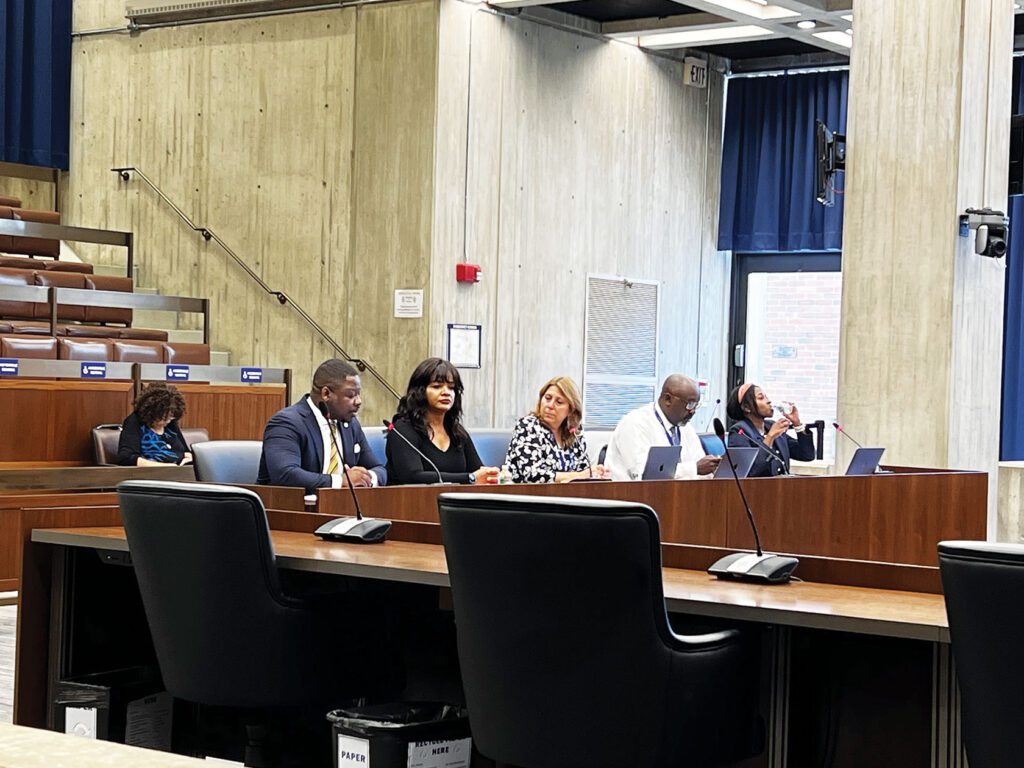
The Boston Public Schools has told the City Council that the district does not maintain a list of people who shouldn’t be hired or rehired, a practice that a former employee and the teachers union indicated they suspected was in place.
The denial came at a Sept. 21 hearing, organized by at-large City Councilor Julia Mejia, to audit hiring, firing and retention practices in the school system and police department. Mejia questioned BPS administrators about the existence of a do-not-hire list.
“There is not a list of ‘do not hire.’ If you are a former employee who has worked in the district, there are instances where you are recommended for not rehiring of that person,” said Francesse Canty, the district’s chief human capital officer.
Canty explained those people have had documented issues, such as harming a child or misappropriating student resources.
Edith Bazile, a former BPS employee who was part of the community panel at the hearing, said in an interview that when she sat on hiring committees, members would recommend that a candidate be hired, only for the human resources department to say at times that the person could not be hired. She said the hiring committee was not told why.
Lea Serena, elementary field representative for the Boston Teachers Union, said the BTU has requested the do-not-hire list and never received confirmation of its existence, but said that in her experience, if an educator leaves the district, the likelihood of them being rehired is low. She said the Office of Human Capital tends not to give a reason why staff — especially staff of color — cannot be rehired.
Community members also raised concerns about fears of retaliation for speaking out about conditions in the schools.
Maria Alejandra Mosquera, a BPS social worker, told the Council that staff retention efforts must be addressed by considering concerns around retaliation.
“Retention and sustainability means if I sit here today and speak my truth, I’m not going to receive retaliation when I go show up to work tomorrow,” Mosquera said.
During the hearing, Mosquera said there needs to be willingness to embrace discomfort as staff of color try to address workplace conditions.
“Safety is not a synonym” for comfort, Mosquera said. “To be unsafe is very different than to be uncomfortable, and that starts with school culture. That’s a collective — not one side or the other — that’s a collective effort.”
Mejia said in an interview that a culture exists in Boston that often leads people of color to face challenges of dismissal for trying to change the systems they work in.
“I don’t think that’s grounds for dismissal, just because you’re challenging the system that you’re operating in,” she said.
The Council received anonymous testimony, submitted in writing, voicing concerns from current or former BPS staff about allegations of racial discrimination in hiring and firing practices within the district.
Mejia read one of those testimonies into the record, saying that it’s important to give voice to the people who didn’t show up in person because they wouldn’t feel safe in their jobs if they did.
During her opening statement, BPS Superintendent Mary Skipper said she is optimistic about this year’s diversity data, citing trends in the past two years toward better representation of staff of color within the district. In last year’s data, according to Skipper, a majority of the BPS workforce was people of color.
Rashaun Martin, director of retention programs and services for educators of color in BPS, said he stands behind the work the district has done.
“Obviously there’s more work to do, but when the numbers are going in the right direction, that matters,” Martin said. “With that being said, we are and have expanded all of the intentional work — and continue to think how to expand it — to support our educators of color.”
Exchanges with BPS about hiring and firing practices in the district were limited, as the three members of the district administration in attendance — Skipper, Canty and Martin — left after 45 minutes after answering a handful question from councilors.
The hearing, which had originally been scheduled for Sept. 5, had been postponed two weeks so BPS administrators could be in attendance.
Mejia’s office said that, when the hearing was scheduled, they were made aware that Skipper would only be able to attend for 45 minutes but were told that Canty would be available for an hour and a half.
At the time of their departure, District 7 City Councilor Tania Fernandes Anderson of Roxbury expressed concerns about their early departure.
“It’s not a conversation if the other side isn’t here,” she said.
At the end of the hearing, Mejia said she will work to schedule another hearing before the end of the year specifically to ask more questions of BPS administrators.
BPS declined to comment about the departure or next steps in the dialogue with the Council.
The hearing follows public discussions about concerns raised by administrators of color who were allegedly pushed out of BPS’s central office under the district’s disciplinary policies. Last month, BPS released a long-awaited report on the situation that had few conclusive findings, citing limited data.
BPS asked Mejia to not include in the hearing a letter sent by 15 retired educators of color, including Bazile, that first highlighted the concerns, and a report released by outside attorney Natashia Tidwell Aug. 30, as they are the subject of litigation.
Because the letter and report were just one example of what people of color in Boston say they are experiencing when it comes to hiring, firing and retention in city jobs — and because the hearing order was first filed independently of those concerns — Mejia said she was OK with omitting it, to avoid crossing boundaries that would be detrimental to trying to address these concerns.






